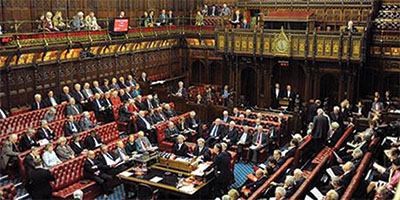2 Stages of a Bill in the UK Parliament
In order to become an Act of the UK Parliament a Bill has to be passed by both the House of Commons and the House of Lords. A Bill may start in either the House of Commons or the House of Lords, with the exception of Finance Bills which always start in the House of Commons. A Finance Bill is introduced by the UK Government shortly after the Budget to bring the government’s tax proposals into law.
Before the Bill can become an Act of the UK Parliament it must undergo a number of stages. Briefly these are as follows.
1 First reading
The title of a Bill is read out and copies of it are printed but no debate takes place. There will be a vote on whether the House wishes to consider the Bill further.
2 Second reading
The general principles contained in the Bill are debated. Frequently, the second reading stage is the point at which public attention becomes drawn to the proposal through press coverage and, on occasion, vociferous campaigns for and against the Bill by groups affected by the Bill. At the end of this debate a vote is taken: a majority must be in favour of the Bill in order for it to progress any further.
3 Committee stage
At this stage a detailed examination of each clause of the Bill is undertaken by a Committee of between 16 and 50 MPs. The Committee subjects the Bill to line-by-line examination and makes amendments. The Committee which carries out these discussions comprises representatives of the different political parties roughly in proportion to the overall composition of the House. Often there will be a government majority on the Committee; however, an attempt is made to ensure representation by minority parties. The membership of the Committee will usually be those with a special interest in, or knowledge of, the subject of the Bill under consideration. (For Finance Bills the whole House of Commons will sit in Committee.)
4 Report stage
A Bill that has been amended in Committee stage is reviewed by the House where it started. The amendments will be debated in the House and accepted or rejected. Further amendments may also be added.
5 Third reading
This is the final vote on the Bill. It is almost a formality since a Bill which has passed through all the stages above is unlikely to fail at this late stage. In fact in the House of Commons there will only be a further debate on the Bill if at least six MPs request it. In the House of Lords amendments are sometimes made at this stage.
6 The House of Lords
The House of Commons and the House of Lords must finally agree on the text of a Bill. If a Bill started life in the House of Commons it is now passed to the House of Lords where it goes through all of the stages outlined above. If the House of Lords makes amendments to the Bill it will go back to the House of Commons for that House to consider those amendments.

If the House of Lords votes against a Bill it can go back to the House of Commons and will become law if the House of Commons passes it for the second time. The reason for this is that the House of Lords is not an elected body and its function is to refine and add to law rather than oppose the will of the democratically elected House of Commons. There are proposals to make the House of Lords more representative and some members of the House of Lords may be elected in the future. This could possibly lead to a change in the role and function of the House of Lords.
